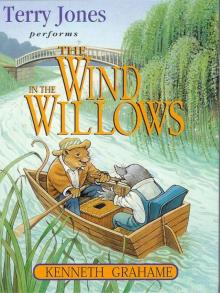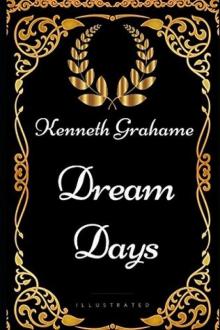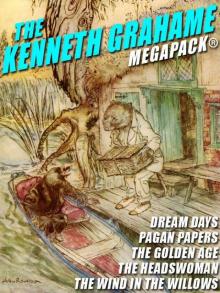- Home
- Kenneth Grahame
Complete Works of Kenneth Grahame
Complete Works of Kenneth Grahame Read online
The Complete Works of
KENNETH GRAHAME
(1859-1932)
Contents
The Children’s Books
THE WIND IN THE WILLOWS
THE CAMBRIDGE BOOK OF POETRY FOR CHILDREN
BERTIE’S ESCAPADE
The Short Story Collections
PAGAN PAPERS
THE GOLDEN AGE
DREAM DAYS
THE HEADSWOMAN
The Non-Fiction
FIRST WHISPER OF ‘THE WIND OF THE WILLOWS’
The Biographies
KENNETH GRAHAME LIFE LETTERS AND UNPUBLISHED WORK by Patrick Chalmers
THE CHILDREN’S ADVOCATE: KENNETH GRAHAME by W. M. Parker
The Delphi Classics Catalogue
© Delphi Classics 2016
Version 1
The Complete Works of
KENNETH GRAHAME
By Delphi Classics, 2016
COPYRIGHT
Complete Works of Kenneth Grahame
First published in the United Kingdom in 2016 by Delphi Classics.
© Delphi Classics, 2016.
All rights reserved. No part of this publication may be reproduced, stored in a retrieval system, or transmitted, in any form or by any means, without the prior permission in writing of the publisher, nor be otherwise circulated in any form other than that in which it is published.
Delphi Classics
is an imprint of
Delphi Publishing Ltd
Hastings, East Sussex
United Kingdom
Contact: [email protected]
www.delphiclassics.com
Parts Edition Now Available!
Love reading Kenneth Grahame?
Did you know you can now purchase the Delphi Classics Parts Edition of this author and enjoy all the novels, plays, non-fiction books and other works as individual eBooks? Now, you can select and read individual novels etc. and know precisely where you are in an eBook. You will also be able to manage space better on your eReading devices.
The Parts Edition is only available direct from the Delphi Classics website.
For more information about this exciting new format and to try free Parts Edition downloads, please visit this link.
The Children’s Books
Castle Street, Edinburgh — Grahame’s birthplace
Grahame, 1910
THE WIND IN THE WILLOWS
Illustrated by Paul Bransom
This famous children’s novel first appeared in 1908 and concerns the adventures of four anthropomorphised animals in a pastoral interpretation of England. Notable for its mixture of mysticism, morality and camaraderie, The Wind in the Willows is celebrated for its evocation of the nature of the Thames valley.
In 1908, Grahame had retired from his position as secretary of the Bank of England and moved with his wife and son back to Berkshire, where he had lived as a child. In his youth he had stayed in a spacious, if dilapidated, home, “The Mount”, by the River Thames, and he was introduced to the riverside and boating by his uncle, David Ingles, curate at Cookham Dean Church. On his return to the area, aged forty-nine, Grahame spent his time by the Thames doing much as the animal characters in his famous book do, “simply messing about in boats” — while expanding the bedtime stories he had earlier told his son Alistair into a manuscript for the novel.
The Wind in the Willows opens with the arrival of spring and fine weather, as the good-natured Mole loses patience with spring cleaning. He flees his underground home and ends up by the river, which he has never seen before. Here he meets Rat (a water vole), who at this time of year spends his days close by the water. Rat takes Mole for a ride in his rowing boat. They get along well and spend many more days boating, with Rat teaching Mole the ways of the river.
One summer day, Rat and Mole disembark near the grand Toad Hall and pay a visit to Toad, who is rich, jovial, friendly and kind-hearted, but aimless and conceited. Toad regularly becomes obsessed with current fads, only to abandon them as quickly as he took them up. Having recently given up boating, Toad’s current craze is his horse-drawn caravan. He persuades the reluctant Rat and willing Mole to join him on a trip. Toad soon tires of the realities of camp life and shirks his chores. Later that day, a passing motorcar scares the horse, causing the caravan to overturn into a ditch. Rat threatens to have the law on the motorcar drivers while Mole calms the horse, but Toad’s craze for caravan travel is immediately replaced by a motorcar obsession.
In addition to the main narrative, the book contains several independent short stories, featuring Rat and Mole. These appear for the most part between the chapters chronicling Toad’s adventures and are often omitted from abridgements and dramatisations of the novel. The chapter “Dulce Domum” describes Mole’s return to his home, accompanied by Rat, in which, despite finding it in a terrible mess after his abortive spring clean, he rediscovers, with Rat’s help, a familiar comfort. “The Piper at the Gates of Dawn” tells how Mole and Rat search for Otter’s missing son Portly, whom they find in the care of the god Pan. (Pan removes their memories of this meeting “lest the awful remembrance should remain and grow, and overshadow mirth and pleasure”.) Finally in “Wayfarers All”, Ratty shows a restless side to his character when he is sorely tempted to join a Sea Rat on his travelling adventures.
The novel was originally published in plain text, followed by many illustrated, comic and annotated editions over the ensuing years. Notable illustrators include Paul Bransom (1913), Ernest H. Shepard (1933), Arthur Rackham (1940), Tasha Tudor (1966), Michael Hague (1980), Scott McKowen (2005) and Robert Ingpen (2007).
At first, a number of publishers rejected the manuscript and it was not until October 1908, after some campaigning by President Theodore Roosevelt that the book was finally published by Methuen and Co. The critics, who were hoping for a third volume in the style of Graham’s earlier works, The Golden Age and Dream Days, generally gave negative reviews. However, with the general public the novel was a commercial success and within a few years it sold in such numbers that many reprints were required. In 1909, Roosevelt, wrote to Grahame to tell him that he had “read it and reread it, and have come to accept the characters as old friends”.
The first edition
The original frontispiece
CONTENTS
I. THE RIVER BANK
II. THE OPEN ROAD
III. THE WILD WOOD
IV. MR. BADGER
V. DULCE DOMUM
VI. MR. TOAD
VII. THE PIPER AT THE GATES OF DAWN
VIII. TOAD’S ADVENTURES
IX. WAYFARERS ALL
X. THE FURTHER ADVENTURES OF TOAD
XI. “LIKE SUMMER TEMPESTS CAME HIS TEARS”
XII. THE RETURN OF ULYSSES
Mapledurham House near Reading, Berkshire, was the inspiration for Toad Hall
The village of Lerryn, Cornwall, is believed by some to be the main setting of the novel.
The frontispiece for the 1913 illustrated edition
I. THE RIVER BANK
THE Mole had been working very hard all the morning, spring-cleaning his little home. First with brooms, then with dusters; then on ladders and steps and chairs, with a brush and a pail of whitewash; till he had dust in his throat and eyes, and splashes of whitewash all over his black fur, and an aching back and weary arms. Spring was moving in the air above and in the earth below and around him, penetrating even his dark and lowly little house with its spirit of divine discontent and longing. It was small wonder, then, that he suddenly flung down his brush on the floor, said, “Bother!” and “O blow!” and also “Hang spring-cleaning!” and bolted out of the house without even waiting to put on
his coat. Something up above was calling him imperiously, and he made for the steep little tunnel which answered in his case to the gravelled carriage-drive owned by animals whose residences are nearer to the sun and air. So he scraped and scratched and scrabbled and scrooged, and then he scrooged again and scrabbled and scratched and scraped, working busily with his little paws and muttering to himself, “Up we go! Up we go!” till at last, pop! his snout came out into the sunlight and he found himself rolling in the warm grass of a great meadow.
“This is fine!” he said to himself. “This is better than whitewashing!” The sunshine struck hot on his fur, soft breezes caressed his heated brow, and after the seclusion of the cellarage he had lived in so long the carol of happy birds fell on his dulled hearing almost like a shout. Jumping off all his four legs at once, in the joy of living and the delight of spring without its cleaning, he pursued his way across the meadow till he reached the hedge on the further side.
“Hold up!” said an elderly rabbit at the gap. “Sixpence for the privilege of passing by the private road!” He was bowled over in an instant by the impatient and contemptuous Mole, who trotted along the side of the hedge chaffing the other rabbits as they peeped hurriedly from their holes to see what the row was about. “Onion-sauce! Onion-sauce!” he remarked jeeringly, and was gone before they could think of a thoroughly satisfactory reply. Then they all started grumbling at each other. “How stupid you are! Why didn’t you tell him—” “Well, why didn’t you say—” “You might have reminded him—” and so on, in the usual way; but, of course, it was then much too late, as is always the case.
It all seemed too good to be true. Hither and thither through the meadows he rambled busily, along the hedgerows, across the copses, finding everywhere birds building, flowers budding, leaves thrusting — everything happy, and progressive, and occupied. And instead of having an uneasy conscience pricking him and whispering “whitewash!” he somehow could only feel how jolly it was to be the only idle dog among all these busy citizens. After all, the best part of a holiday is perhaps not so much to be resting yourself, as to see all the other fellows busy working.
He thought his happiness was complete when, as he meandered aimlessly along, suddenly he stood by the edge of a full-fed river. Never in his life had he seen a river before — this sleek, sinuous, full-bodied animal, chasing and chuckling, gripping things with a gurgle and leaving them with a laugh, to fling itself on fresh playmates that shook themselves free, and were caught and held again. All was a-shake and a-shiver — glints and gleams and sparkles, rustle and swirl, chatter and bubble. The Mole was bewitched, entranced, fascinated. By the side of the river he trotted as one trots, when very small, by the side of a man who holds one spellbound by exciting stories; and when tired at last, he sat on the bank, while the river still chattered on to him, a babbling procession of the best stories in the world, sent from the heart of the earth to be told at last to the insatiable sea.
As he sat on the grass and looked across the river, a dark hole in the bank opposite, just above the water’s edge, caught his eye, and dreamily he fell to considering what a nice, snug dwelling-place it would make for an animal with few wants and fond of a bijou riverside residence, above flood level and remote from noise and dust. As he gazed, something bright and small seemed to twinkle down in the heart of it, vanished, then twinkled once more like a tiny star. But it could hardly be a star in such an unlikely situation; and it was too glittering and small for a glow-worm. Then, as he looked, it winked at him, and so declared itself to be an eye; and a small face began gradually to grow up round it, like a frame round a picture.
A brown little face, with whiskers.
A grave round face, with the same twinkle in its eye that had first attracted his notice.
Small neat ears and thick silky hair.
It was the Water Rat!
Then the two animals stood and regarded each other cautiously.
“Hullo, Mole!” said the Water Rat.
“Hullo, Rat!” said the Mole.
“Would you like to come over?” enquired the Rat presently.
“Oh, it’s all very well to talk,” said the Mole rather pettishly, he being new to a river and riverside life and its ways.
The Rat said nothing, but stooped and unfastened a rope and hauled on it; then lightly stepped into a little boat which the Mole had not observed. It was painted blue outside and white within, and was just the size for two animals; and the Mole’s whole heart went out to it at once, even though he did not yet fully understand its uses.
The Rat sculled smartly across and made fast. Then he held up his fore-paw as the Mole stepped gingerly down. “Lean on that!” he said. “Now then, step lively!” and the Mole to his surprise and rapture found himself actually seated in the stern of a real boat.
“This has been a wonderful day!” said he, as the Rat shoved off and took to the sculls again. “Do you know, I’ve never been in a boat before in all my life.”
It was the Water Rat
“What?” cried the Rat, open-mouthed: “Never been in a — you never — well I — what have you been doing, then?”
“Is it so nice as all that?” asked the Mole shyly, though he was quite prepared to believe it as he leant back in his seat and surveyed the cushions, the oars, the rowlocks, and all the fascinating fittings, and felt the boat sway lightly under him.
“Nice? It’s the only thing,” said the Water Rat solemnly as he leant forward for his stroke. “Believe me, my young friend, there is nothing — absolute nothing — half so much worth doing as simply messing about in boats. Simply messing,” he went on dreamily: “messing — about — in — boats; messing—”
“Look ahead, Rat!” cried the Mole suddenly.
It was too late. The boat struck the bank full tilt. The dreamer, the joyous oarsman, lay on his back at the bottom of the boat, his heels in the air.
“ — about in boats — or with boats,” the Rat went on composedly, picking himself up with a pleasant laugh. “In or out of ‘em, it doesn’t matter. Nothing seems really to matter, that’s the charm of it. Whether you get away, or whether you don’t; whether you arrive at your destination or whether you reach somewhere else, or whether you never get anywhere at all, you’re always busy, and you never do anything in particular; and when you’ve done it there’s always something else to do, and you can do it if you like, but you’d much better not. Look here! If you’ve really nothing else on hand this morning, supposing we drop down the river together, and have a long day of it?”
The Mole waggled his toes from sheer happiness, spread his chest with a sigh of full contentment, and leant back blissfully into the soft cushions. “What a day I’m having!” he said. “Let us start at once!”
“Hold hard a minute, then!” said the Rat. He looped the painter through a ring in his landing-stage, climbed up into his hole above, and after a short interval reappeared staggering under a fat wicker luncheon-basket.
“Shove that under your feet,” he observed to the Mole, as he passed it down into the boat. Then he untied the painter and took the sculls again.
“What’s inside it?” asked the Mole, wriggling with curiosity.
“There’s cold chicken inside it,” replied the Rat briefly:
“coldtonguecoldhamcoldbeefpickledgherkinssaladfrenchrolls–
cresssandwichespottedmeatgingerbeerlemonadesodawater—”
“O stop, stop!” cried the Mole in ecstasies. “This is too much!”
“Do you really think so?” enquired the Rat seriously. “It’s only what I always take on these little excursions; and the other animals are always telling me that I’m a mean beast and cut it very fine!”
The Mole never heard a word he was saying. Absorbed in the new life he was entering upon, intoxicated with the sparkle, the ripple, the scents and the sounds and the sunlight, he trailed a paw in the water and dreamed long waking dreams. The Water Rat, like the good little fellow he was, sculled steadily on and forbore to d
isturb him.
“I like your clothes awfully, old chap,” he remarked after some half an hour or so had passed. “I’m going to get a black velvet smoking-suit myself some day, as soon as I can afford it.”
“I beg your pardon,” said the Mole, pulling himself together with an effort. “You must think me very rude; but all this is so new to me. So — this — is — a — River!”
“The River,” corrected the Rat.
“And you really live by the river? What a jolly life!”
“By it and with it and on it and in it,” said the Rat. “It’s brother and sister to me, and aunts, and company, and food and drink, and (naturally) washing. It’s my world, and I don’t want any other. What it hasn’t got is not worth having, and what it doesn’t know is not worth knowing. Lord! the times we’ve had together! Whether in winter or summer, spring or autumn, it’s always got its fun and its excitements. When the floods are on in February, and my cellars and basement are brimming with drink that’s no good to me, and the brown water runs by my best bedroom window; or again when it all drops away and shows patches of mud that smells like plum-cake, and the rushes and weed clog the channels, and I can potter about dry shod over most of the bed of it and find fresh food to eat, and things careless people have dropped out of boats!”
“But isn’t it a bit dull at times?” the Mole ventured to ask. “Just you and the river, and no one else to pass a word with?”
“No one else to — well, I mustn’t be hard on you,” said the Rat with forbearance. “You’re new to it, and of course you don’t know. The bank is so crowded nowadays that many people are moving away altogether. O no, it isn’t what it used to be, at all. Otters, king-fishers, dabchicks, moorhens, all of them about all day long and always wanting you to do something — as if a fellow had no business of his own to attend to!”

 The Wind in the Willows
The Wind in the Willows Dream Days
Dream Days Complete Works of Kenneth Grahame
Complete Works of Kenneth Grahame The Kenneth Grahame Megapack
The Kenneth Grahame Megapack The Modern Library Children's Classics
The Modern Library Children's Classics